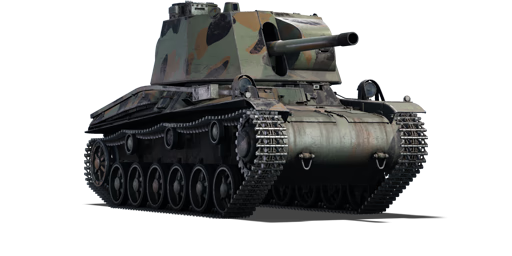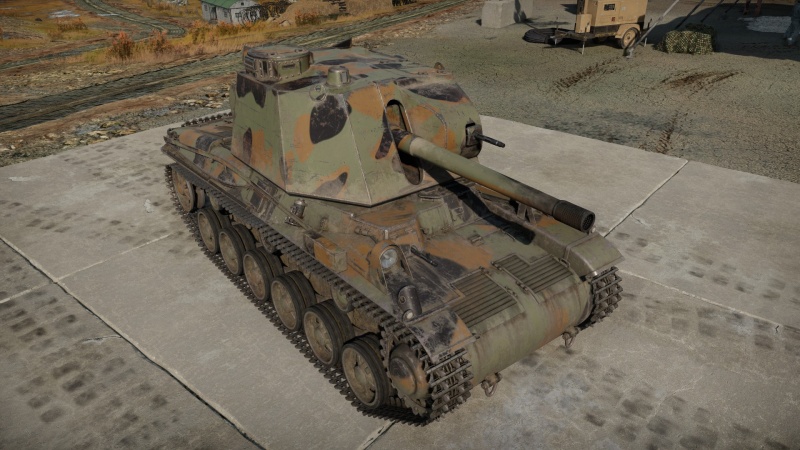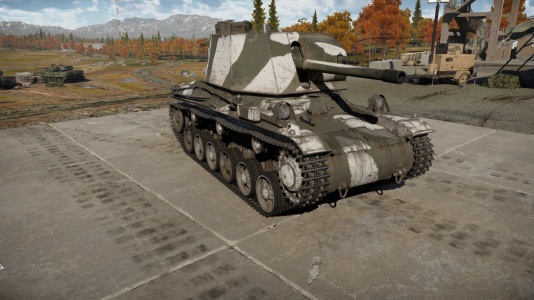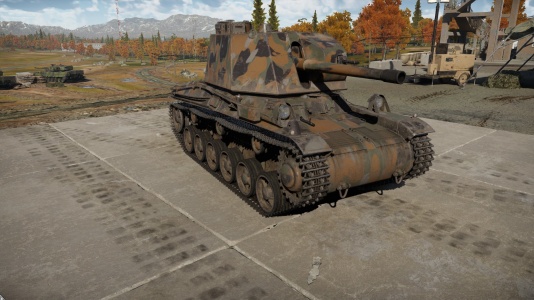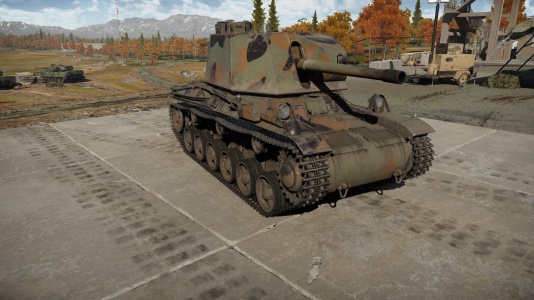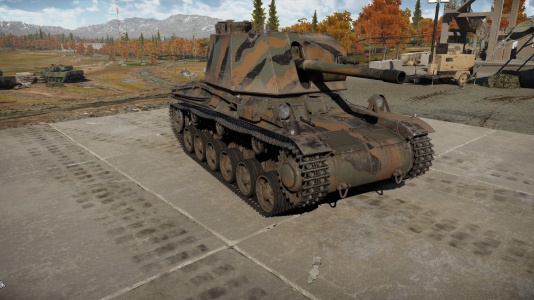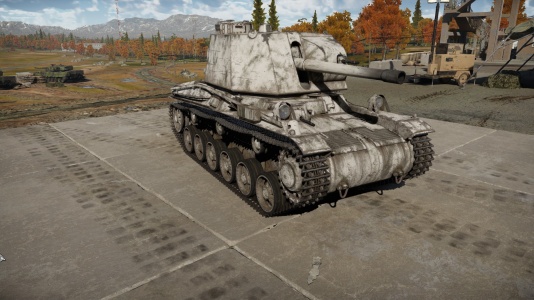Difference between revisions of "Strv m/42 DT"
DivineCross8 (talk | contribs) (Added a point in the pro section of the pro vs con table) (Tag: Visual edit) |
Colok76286 (talk | contribs) (Undo revision 185908 by U129165188 (talk)) |
||
| Line 162: | Line 162: | ||
* Mobile enough to flank when spaded | * Mobile enough to flank when spaded | ||
* Still has a reasonable fire rate when first-stage rack runs out | * Still has a reasonable fire rate when first-stage rack runs out | ||
| − | |||
'''Cons:''' | '''Cons:''' | ||
Revision as of 19:00, 1 May 2024
Contents
Description
The Strv m/42 was introduced during the Second World War as Sweden's primary medium tank. Different versions were developed, however, one of the most experimental ones was the Strv m/42 DT (Delat Torn; "split turret"). Unlike most designs of the time, the new variant used a new turret, with a 75 mm gun and an autoloader. The name comes from the fact that the autoloader forced the turret to be split in half. In 1944, a mockup was made, with a prototype constructed in 1945, however after being tested in different trials in 1946 the design was considered unsuccessful and the project was canceled.
It was introduced in Update 1.97 "Viking Fury". The Strv m/42 DT's most important asset is the reload rate, which can be as low as 3 seconds. The best round available is an APCBC shell that features similar penetration and explosive filler values to other rounds at its rank. The armour is almost non-existent, comparable more to a light tank, and the autoloader makes the tank more vulnerable to ammo detonations, since the ammo racks are more exposed. However, the tank has still a decent mobility to the point it can be used to flank, and the gun depression is also good at -10 degrees.
General info
Survivability and armour
The hull of the Strv m/42 DT is identical to that of its predecessor, the Strv m/42 EH. While decent for its BR on the earlier tank, the hull armour is no longer good against the bigger guns that the Strv m/42 DT faces.
However, the Strv m/42 DT also sports a new turret to house the more powerful gun. The turret front is 60 mm thick, and the right side and area around the main gun is an angled flat plate. While not very thick, it is capable of ricocheting some rounds if the effective angle is increased using the excellent gun depression of the Strv m/42 DT. The left side housing the machine gun is rounded and is a weakspot when hull-down.
It is important to note that the turret has an open rear that exposes the crew to machine gun fire and shrapnel. It is also a considerably bigger target than the Strv m/42's turret. Most importantly, the gun autoloader is poking out of the turret and can be easily damaged by any aircraft, which is arguably even worse than losing a crew member.
Close artillery misses won't destroy this tank, but any direct hit to the turret's roof will penetrate and decimate the entire crew. HEAT hits on the turret front won't result in overpressure damage.
Armour type:
| Armour | Front (Slope angle) | Sides | Rear | Roof |
|---|---|---|---|---|
| Hull | ___ mm | ___ mm Top ___ mm Bottom |
___ mm | ___ - ___ mm |
| Turret | ___ - ___ mm Turret front ___ mm Gun mantlet |
___ - ___ mm | ___ - ___ mm | ___ - ___ mm |
| Cupola | ___ mm | ___ mm | ___ mm | ___ mm |
Notes:
Mobility
| Game Mode | Max Speed (km/h) | Weight (tons) | Engine power (horsepower) | Power-to-weight ratio (hp/ton) | |||
|---|---|---|---|---|---|---|---|
| Forward | Reverse | Stock | Upgraded | Stock | Upgraded | ||
| Arcade | 51 | 7 | 23.5 | 635 | 782 | 27.02 | 33.28 |
| Realistic | 46 | 7 | 363 | 410 | 15.45 | 17.45 | |
Unsurprisingly, the mobility of the Strv m/42 DT is very similar to that of the Strv m/42. It can reach a respectable top speed and will usually be able to keep up with most advances, but suffers from a low reverse speed of about 5 km/h that makes it harder to back up from hull-down positions or into cover.
Modifications and economy
Armaments
Main armament
The Strv m/42 DT is armed with the same 7,5 cm pvkan m/43 used by the Pvkv m/43 tank destroyer. However, on the Strv m/42 DT, the gun is fed by a special semi-automatic loader with a four-round clip (similar to the Japanese Chi-Ri medium tank), allowing for a fast five-round burst (including one pre-loaded in the gun barrel) after which the gun must be reloaded manually.
With the autoloader, the reload takes from 3.9 to 3 seconds, which otherwise would take around 8-6 seconds. This allows the tank to swap between kinetic and HE shells on the fly and to sometimes reload before enemy drives out of cover to retaliate.
As is usual for Swedish vehicles, the turret provides for decent gun depression an -10° , though gun elevation is limited to only +12°, which stops the tank from fighting when charging down or along the side of a hill. The gun stabilizes rather quickly as long as the targeting skill of the crew is maxed out and tank isn't driving over rough terrain.
On a capture point, each spent shell is restocked in about 5.5 seconds. This is important to keep in mind, as the semi-auto loader rearms extremely slowly, forcing the tank to not fire for 25 seconds after the last shot for the first shell to be loaded and another 18 for each next one. Restocking the autoloader magazine on a capture point circumvents this and reloads the autoloader faster, which might allow to repel more tanks than normal.
Note that the gun breech is rather large and takes up a lot of room in the turret, thus a turret penetration is likely to also result in a damaged breech.
| 75 mm pvkan m/43 | Turret rotation speed (°/s) | Reloading rate (seconds) | |||||||||||
|---|---|---|---|---|---|---|---|---|---|---|---|---|---|
| Mode | Capacity | Vertical | Horizontal | Stabilizer | Stock | Upgraded | Full | Expert | Aced | Stock | Full | Expert | Aced |
| Arcade | 42 | -10°/+12° | ±180° | N/A | 14.3 | 19.8 | 24.0 | 26.5 | 28.2 | 3.90 | 3.45 | 3.18 | 3.00 |
| Realistic | 8.9 | 10.5 | 12.8 | 14.1 | 15.0 | ||||||||
Ammunition
| Penetration statistics | |||||||
|---|---|---|---|---|---|---|---|
| Ammunition | Type of warhead |
Penetration @ 0° Angle of Attack (mm) | |||||
| 10 m | 100 m | 500 m | 1,000 m | 1,500 m | 2,000 m | ||
| slpprj m/41 | AP | 139 | 136 | 121 | 104 | 90 | 78 |
| sgr m/38 | HE | 18 | 17 | 16 | 14 | 13 | 12 |
| slpgr m/43 | APCBC | 149 | 146 | 132 | 116 | 102 | 89 |
| Shell details | ||||||||||||
|---|---|---|---|---|---|---|---|---|---|---|---|---|
| Ammunition | Type of warhead |
Velocity (m/s) |
Projectile mass (kg) |
Fuse delay (m) |
Fuse sensitivity (mm) |
Explosive mass (TNT equivalent) (g) |
Ricochet | |||||
| 0% | 50% | 100% | ||||||||||
| slpprj m/41 | AP | 815 | 6.63 | - | - | - | 47° | 60° | 65° | |||
| sgr m/38 | HE | 840 | 6.43 | 0.2 | 0.1 | 690 | 79° | 80° | 81° | |||
| slpgr m/43 | APCBC | 890 | 6 | 1.2 | 14 | 110 | 48° | 63° | 71° | |||
The Strv m/42 DT starts with the rather underwhelming stock slpprj m/41 uncapped AP shot, which has no explosive filler. However, at Rank IV the excellent slpgr m/43 APCBC shell becomes available. Not only does it ricochet less than the stock AP, has a higher muzzle velocity, and has better penetration, it also has a lethal 110 g TNT filler that is devastating when it penetrates.
The penetration of kinetic shells is not very good for a tank of this BR, but the Strv m/42 DT is quite tall and at close to medium range it can negate enemy angled armour with that alone.
The sgr m/38 is not to be ignored, as there are a lot of open-topped SPG at the rank, which are difficult to take out with kinetic ammunition, but will definitely fail to reload before HE is fired at them, should they survive the first shot.
Ammo racks
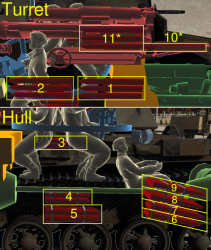
| Full ammo |
1st rack empty |
2nd rack empty |
3rd rack empty |
4th rack empty |
5th rack empty |
6th rack empty |
|---|---|---|---|---|---|---|
| 42 | 40 (+2) | 37 (+5) | 31 (+11) | 25 (+17) | 19 (+23) | 16 (+26) |
| 7th rack empty |
8th rack empty |
9th rack empty |
10th* rack empty |
11th* rack empty |
Visual discrepancy | |
| 13 (+29) | 9 (+33) | 5 (+37) | 4 (+38) | 1 (+41) | No |
Notes:
- The first-stage ammo racks provide the vehicle with a faster reload but has a small capacity (4 rounds), however the vehicle is also capable of reloading the main gun directly from the other ammo racks.
- The turret can never be fully empty without depleting the first-stage racks, and the hull can only be empty if you take 5 or less shells
Machine guns
The Strv m/42 DT has a standard 8 mm coaxial machine gun. While it is slightly bigger in calibre than 7.62 or 7.7 mm MGs met on comparable vehicles, the machine gun lacks penetration power to damage most opponents. Nevertheless the ksp m/36 machine gun can be used against open-topped vehicles. Furthermore, it also has an additional 13 degrees of elevation which can prove useful in engaging enemy planes.
| 8 mm ksp m/36 | ||||
|---|---|---|---|---|
| Mount | Capacity (Belt) | Fire rate | Vertical | Horizontal |
| Coaxial | 4,000 (250) | 648 | -10°/+25° | N/A |
Usage in battles
The Strv m/42 DT's standout feature is an excellent reload rate, which can be as low as 3 seconds. To complement this gun, the Strv m/42 DT is equipped with a stock AP round, and an APCBC shell which has reasonable penetration and explosive filler values compared to similarly-sized rounds at this tier. At its best, the gun will easily blast most medium and light tanks, but will struggle with the heavy tanks, so choose your fights accordingly.
This vehicle is not especially well-armoured. It can often withstand one or two hits, but any more and it will usually be destroyed. Taking high ammunition loads further hampers the tank's survivability, as it makes the chance of an ammunition detonation significant. Additionally, the ammo racks in the front of the hull will almost always have ammo in them, and while they're in a position unlikely to be shot from the front, a shot to the front of the hull from the side can result in an ammo detonation. From the side, a weak armour setup means that autocannons on many anti-air vehicles can penetrate and deal massive damage to internal components. This means, that tank commanders might want to rely on teamwork, much like with the Pvkv II, as either teammates take the hit and leave the enemy exposed to at least two counter shots, or finish the job while the Strv m/42 DT repairs or disables something else. Either way, with armour this thin, it is necessary to pay attention to enemy flankers.
The Strv m/42 DT's hull is taken from the earlier Strv m/42 EH, and thanks to an improved engine, is above-average in terms of mobility. When stock, mobility can be sub-par, but once mobility modules have been researched, the tank becomes quite capable in this department. With this level of mobility, it can acquire ambush positions or act as a viable flanker. (In such situations, the gun's quick reload makes itself very useful; the Strv m/42 DT is able to destroy multiple unsuspecting enemies in quick succession.) One thing to note is that this tank has a poor reverse speed, which can make peeking and firing from behind ridgelines dangerous.
In hull-down positions, this vehicle can use its great gun depression to effectively fire at enemies from behind cover, but it's best to avoid exploiting it to try and fight over high hills, as it's not as great as on the SPGs and tanks before it.
Pros and cons
Pros:
- Excellent reload rate allows to fire twice per normal enemy reload
- Ammunition reload on a capture point loads into the ready-rack almost as fast as the firerate, allowing for consistent rapid fire
- Decent gun depression
- Mobile enough to flank when spaded
- Still has a reasonable fire rate when first-stage rack runs out
Cons:
- Poor stock uncapped AP shot with no explosive filler, and the APHE starts to become inadequate when fighting head-on in uptier
- Very long ready-rack reload, unless on a capture point
- Narrow tracks reduce off-road mobility
- Poor reverse speed will let most tanks to fire back before it can retreat
- Lightly armoured
- Poor ammo rack configuration
- Large and visible profile
- Gun loader and breech can be easily destroyed by an airstrike
History
In 1944, the Swedish military considered upgunning the Strv m/42. They designed a new turret with a new 75 mm gun with an autoloader. The turret was named "Delat Torn", which means "split turret" in English. This name comes from the fact that the autoloader would split the turret down the middle into two separate compartments. The gun was set as far back as possible inside the turret in order to reduce how much of the barrel hung out of the turret. In 1944, a mockup was made, with a wooden turret. The prototype was made in 1945, and it was tested throughout 1946. It was found that the design was unsuccessful, and it never entered production or service.
Media
- Skins
- Images
See also
- Related development
- Similar Role
External links
References
- Bibliography
- David B. (2016, June 2). Stridsvagn m/42. Tank Encyclopedia. https://tanks-encyclopedia.com/ww2/sweden/stridsvagn-m42.php
| AB Landsverk | |
|---|---|
| Light Tanks | |
| L-10 | Strv m/31 |
| L-60 | Strv m/38 · Strv m/39 · Strv m/40L |
| Pbil m/40 | Pbil m/40 |
| Strv 74 | Strv 74 |
| Unimog 404 | U-SH 405 |
| Medium Tanks | |
| Lago | Lago I · Strv m/42 EH · Ikv 73 · Strv m/42 DT |
| Tank Destroyers | |
| Ikv 72 | Ikv 72 · Ikv 103 |
| Pvkv m/43 | Pvkv m/43 (1946) · Pvkv m/43 (1963) |
| Pvkv II/III | Pvkv II · Pvkv III |
| SPAA | Pvlvv fm/42 · L-62 ANTI II |
| Sweden medium tanks | |
|---|---|
| Strv m/42 | Lago I · Strv m/42 EH · Ikv 73 · Strv m/42 DT · Pvkv IV |
| Centurion derivatives | Strv 81 · Strv 81 (RB 52) · Strv 101 · Strv 104 · Strv 105 |
| Strv 103 | Strv 103-0 · Strv 103A · Strv 103С |
| Strv 121/122 | Strv 121 · Christian II · Strv 122A · Strv 122B PLSS · Strv 122B+ |
| Other | Sherman III/IV · T 80 U |
| Finland | |
| WWII | ▄T-28 · ▄T-34 · ▄Pz.IV · ▄T-34-85 |
| Post War | ▄Comet I · ▄Charioteer Mk VII · ▄T-54 · ▄T-55M · ▄T-72M1 · ▄Leopard 2A4 · ▄Leopard 2A6 |
| Norway | Leopard 1A5NO2 |


